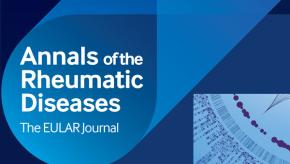All News
PCR: Prevalence, Cost, & Risk (6.27.2025)
Dr. Jack Cush reviews the news and journal reports from last week on RheumNow.com
Read ArticleARD's Impact Factor
d
EULAR
Annals of the Rheumatic Diseases (ARD) is the official journal of EULAR –The European Alliance of Associations for Rheumatology. An international peer-reviewed publication committed to promoting the highest standards of scientific exchange and education.
HLA-B27 Testing in Practice
A single center study shows HLA-B27 testing is often performed by both by rheumatologists and nonrheumatologists for a wide array of reasons and often along with other serologic tests. Optimal use of HLA-B27 testing has yet to be defined.
Read Article
All Rheumatoid Arthritis is Not the Same
Dr. Jonathan Kay reviews abstracts OP0323 and OP0328 from the EULAR 2025 meeting in Barcelona, Spain.
https://t.co/rbK3Y1NHVI https://t.co/eYPdbx87kt
Links:
Dr. John Cush RheumNow ( View Tweet)

Assessment of Peripheral Arthritis in Spondyloarthritis
Dr. Antoni Chan talks with Dr. Dafne Capelusnik about abstract POS0257 presented at the 2025 EULAR meeting in Barcelona.
https://t.co/E6l6qvNnox https://t.co/gLbMjF406q
Dr. John Cush RheumNow ( View Tweet)

Resilience or Resignation? Rethinking Pain, Aging, and Quality of Life
Dr. Jiha Lee reports on abstract POS0402 - THE ROLE OF AGEING IN THE RELATIONSHIP BETWEEN CHRONIC MUSCULOSKELETAL PAIN AND HEALTH-RELATED QUALITY OF LIFE: THE MAASTRICHT STUDY - presented at the 2025 EULAR https://t.co/AiP57hXIRB
Dr. John Cush RheumNow ( View Tweet)

Remission in Axial Spondyloarthritis Unrelated to Gut Inflammation
Most patients with early, active axial spondyloarthritis (axSpA) who quickly received a tumor necrosis factor (TNF) inhibitor experienced remission, and it didn't matter whether or not they had intestinal https://t.co/Sa10k6neRP
Dr. John Cush RheumNow ( View Tweet)

GRAPPA vs. EULAR on Complex/Difficult-to-Manage Psoriatic Arthritis
Following the establishment of formal definitions for Difficult-to-Treat Rheumatoid Arthritis (D2T RA) by EULAR and Difficult-to-Manage axial Spondyloarthritis (D2M axSpA) by ASAS, the “Difficult” framework has https://t.co/NYgivNRgUV
Dr. John Cush RheumNow ( View Tweet)

Trends and Innovations from Barcelona (6.20.2025)
Dr. Jack Cush reviews highlights, trends and novel studies from EULAR 2025 in Barcelona from last week.
https://t.co/iEiQI8GACt https://t.co/X27CuZb5wH
Dr. John Cush RheumNow ( View Tweet)

Simple Measures are Effective in Knee Osteoarthritis
Knee braces, water therapy and exercise are the most promising non-drug therapies for treating knee osteoarthritis, according to a new meta-analysis publishing June 18, 2025 in the open-access journal PLOS One by Yuan Luo of https://t.co/4VQpKQJwXu
Dr. John Cush RheumNow ( View Tweet)

AI in Early Diagnosis of Giant Cell Arteritis
Dr. Bella Mehta reviews abstract OP0343 - THE CLAUDICAITIO MODEL: ULTRASOUND IMAGE CLASSIFICATION IN GIANT CELL ARTERITIS BY APPLICATION OF ARTIFICIAL INTELLIGENCE - at the 2025 EULAR meeting in Barcelona.
https://t.co/lJFuAgmSTH https://t.co/R1tbYpJ74o
Links:
Dr. John Cush RheumNow ( View Tweet)

Rheumatoid Arthritis Panel: EULAR 2025
Panelists Drs. Mrinalini Dey, Janet Pope, Jonathan Kay and Jack Cush review RA studies and sessions presented at the 2025 EULAR meeting in Barcelona, Spain. Abstracts discussed: OP0004; OP0105; LB0006; OP0327; OP0330; OP0232; 0P0190. https://t.co/hmosUKOgTt
Dr. John Cush RheumNow ( View Tweet)

IL-17 inhibitors - Long-term Extensions and Uveitis
Dr. Peter Nash offers his perspective on data presented at the 2025 EULAR meeting in Barcelona.
https://t.co/eQd0TcQn76 https://t.co/6Zog4LC8Aj
Links:
Dr. John Cush RheumNow ( View Tweet)

FDA adds new warning for "myocarditis" to the Pfizer and Moderna COVID-19 vaccines (prev mainly assoc w/ Moderna) - risk is 8 per 1 million people for those on 2023-2024 COVID shots, most common in males ages 12 to 24. Generally good outcomes seen. https://t.co/QZbTRaKGH1 https://t.co/1cAUw73eqF
Links:
Dr. John Cush RheumNow ( View Tweet)

Jekyll and Hyde: which RA-ILD is it?
Dr. David Liew reports on abstract OP0329 presented at the EULAR 2025 meeting in Barcelona, Spain.
https://t.co/oH9nXaKRDz https://t.co/iUAJk2Q856
Dr. John Cush RheumNow ( View Tweet)

Prospective KORAIL study of 138 RA pts w/ ILD on chest CT -60% had UIP ILD. After F/U of 2.9 yrs, 35% had RA-ILD progression. Baseline predictors of progression = UIP, ILD >10 %, DLCO %pred, CCP+, KL-6 levels, RA Dz activity. Useful to ID high-risk RA-ILD pts.
Dr. John Cush RheumNow ( View Tweet)

Aortic aneurysms w/ GCA. TriNetX study of 7,294 Bx-proven GCA vs 265,948 controls w/ tension HA. GCA had signif higher 5-yr risk of aortic aneurysms (3.59%; aHR 1.98), including thoracic thoracoabdominal & abdominal. Carotid A stenosis also incr in GCA (aHR 1.59) https://t.co/15fwlHa0FG
Dr. John Cush RheumNow ( View Tweet)

There's an App for That (and it works): the AXIA RCT
Dr. Aurelie Najm reports on abstract LB0002 presented at the EULAR 2025 meeting in Barcelona, Spain.
https://t.co/IRZ1L7BqLW https://t.co/Av2vVheShE
Links:
Dr. John Cush RheumNow ( View Tweet)

JAMA Clinical Challenge - 34-yoF with Forearm Pain and Stiffness. 1 yr of progressive skin tightening over forearms, tibia, LOM of fingers & elbows. Denied DM, Raynauds. Worse after tennis, better w/ steroids. Increased ANA, eosinophils, CRP, aldolase - your Dx? https://t.co/ppuzIB4iRf
Dr. John Cush RheumNow ( View Tweet)

What we need in very early arthritis
It's easy to think that in our current world that we've done it all for rheumatoid arthritis, that there's nothing left to be done after b/tsDMARDs have become relatively widespread and accessible. If we aren’t satisfied that we’ve done all https://t.co/v8T3JQwuhM
Dr. John Cush RheumNow ( View Tweet)






